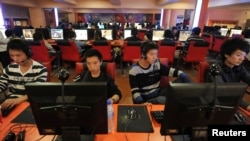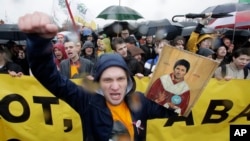ເອກະສານທີ່ຮົ່ວໄຫລອອກມາ ໄດ້ຖືກມອບໃຫ້ແກ່ RFE/RL ທີ່ເປັນເຄືອຂ່າຍສາຂາຂອງວີໂອເອ ຢືນຢັນລາຍງານຕ່າງໆ ທີ່ວ່າ ຣັດເຊຍ ແລະຈີນ ປະສານ ງານກັນກ່ຽວກັບການກວດກາ ແລະວາງຍຸດທະວິທີໃນການຄວບຄຸມທາງ ອິນເຕີເນັດ.
ເນື້ອຫາລາຍລະອຽດຕ່າງໆໃນເອກະສານ ແລະບັນທຶກສຽງທັງຫຼາຍ ໄດ້ກ່າວວ່າ ແມ່ນມາຈາກກອງປະຊຸມປິດລັບ ໃນປີ 2017 ແລະ 2019 ລະຫວ່າງບັນດາເຈົ້າໜ້າທີ່ ຈາກອົງການຕ່າງໆຂອງຈີນ ແລະຣັດເຊຍ ທີ່ຮັບຜິດ ຊອບກັບການກວດກາອິນເຕີເນັດໃນທັງສອງປະເທດ.
ໃນເອກະສານແລະບັນທຶກສຽງເຫຼົ່ານັ້ນ-ທີ່ລາຍງານ ໂດຍ RFE/RL- ເຈົ້າໜ້າ ທີ່ຈາກທັງສອງປະເທດດັ່ງກ່າວ ໄດ້ແບ່ງປັນຍຸດທະສາດຕ່າງໆ ສຳລັບການ ຕິດຕາມພວກທີ່ບໍ່ເຫັນພ້ອມ ແລະການຄວບຄຸມອິນເຕີເນັດ, ລວມທັງການ ຮ້ອງຂໍຄວາມຊ່ອຍເຫຼືອເພື່ອກີດກັ້ນລາຍງານຂ່າວ ທີ່ “ອັນຕະລາຍ” ແລະໃຫ້ ຄຳແນະນຳກ່ຽວກັບການເອົາຊະນະເທັກໂນໂລຈີໃນການຫລີກເວັ້ນ.
RFE/RL ໄດ້ກ່າວວ່າ ໜ່ວຍງານສືບສວນຂອງຣັດເຊຍ ໄດ້ມາຊຶ່ງບັນທຶກສຽງ ແລະເອກະສານຈາກແຫລ່ງຂ່າວ ຜູ້ທີ່ເຂົ້າເຖິງໄດ້ເນື້ອຫາຕ່າງໆ. ກຸ່ມ DDoSecrets ຊຶ່ງເປັນກຸ່ມທີ່ໄດ້ ນຳອອກເຜີຍແຜ່ເອກະສານຮົ່ວໄຫລ ແລະເອກະສານທີ່ຖືກລັກເຈາະເອົາມານັ້ນ ໄດ້ສະໜອງ ຊອຟແວລ ຫຼື ໂປຣແກຣມ ເພື່ອຊອກຫາແຟ້ມຕ່າງໆ.
ວີໂອເອ ບໍ່ໄດ້ເຫັນແຟ້ມດັ່ງກ່າວ.
ໃນຂະນະທີ່ມີລາຍງານກ່ອນໜ້ານີ້ແລ້ວ ກ່ຽວກັບມົສກູ ແລະປັກກິງ ປະສານງານກັນໃນດ້ານຍຸດທະວິທີ ທີ່ກ່ຽວຂ້ອງກັບການກວດຂ່າວ ແລະຮູບແບບຕ່າງໆຂອງການປາບປາມ, ເນື້ອໃນຂອງການສົນທະນາທີ່ສະເພາະເຈາະຈົງ ຊຶ່ງບໍ່ເຄີຍຖືກລາຍງານໃນເມື່ອກ່ອນ.
ທັງສະຖານທູດຂອງຣັດເຊຍ ແລະຈີນ ໃນນະຄອນຫຼວງວໍຊິງຕັນ ບໍ່ໄດ້ຕອບອີເມລ ຂອງວີໂອເອ ທີ່ຮ້ອງຂໍໃຫ້ມີຄວາມເຫັນ.
ໃນບາງສ່ວນຂອງເນື້ອຫາໃນເອກະສານທີ່ຮົ່ວໄຫລນັ້ນ ພວກເຈົ້າໜ້າທີ່ຂອງຈີນ ປາກົດວ່າ ໄດ້ຖາມຣັດເຊຍ ເພື່ອຂໍຄຳແນະນຳ ກ່ຽວກັບການຮັບມືກັບພວກຄົນທີ່ບໍ່ເຫັນພ້ອມ ແລະການຄຸ້ມຄອງສື່ມວນຊົນ, ດັ່ງທີ່ລາຍງານໄດ້ກ່າວ. ໃນຂະນະດຽວກັນ ພວກເຈົ້າໜ້າທີ່ຂອງຣັດເຊຍ ກໍໄດ້ຖາມເພື່ອຂໍຄຳແນະນຳຈາກປັກກິ່ງ ກ່ຽວກັບເລື້ອງຕ່າງໆ ເຊັ່ນວ່າ ວີທີສະກັດກັ້ນເຄື່ອງມືໃນການຫລີກເວັ້ນ ຄືວ່າພວກ VPN ແລະການຄຸ້ມຄອງລະບົບສົ່ງຂໍ້ຄວາມທັງຫຼາຍ.
Leaked documents provided to VOA’s sister network RFE/RL confirm reports that Russia and China collaborate on censorship and internet control tactics.
The materials detail documents and recordings said to be from closed-door meetings in 2017 and 2019 between officials from the Chinese and Russian agencies charged with policing the internet in both countries.
In those documents and recordings — reported on by RFE/RL — officials from both countries share strategies for tracking dissent and controlling the internet, including requests for help to block “dangerous” news articles and advice on beating circumvention technology.
RFE/RL said its Russian Investigative Unit obtained the recordings and documents from a source who had access to the materials. DDoSecrets, a group that publishes leaked and hacked documents, provided software to search the files.
VOA has not seen the files.
While there have been previous reports about Moscow and Beijing collaborating on tactics related to censorship and other forms of repression, the content of these specific conversations had never before been reported.
Neither the Russian Embassy nor the Chinese Embassy in Washington responded to VOA’s emails requesting comment.
In some of the leaked materials, Chinese officials appear to ask Russia for advice on dealing with popular dissent and regulating media, the report said. Meanwhile, Russian officials asked for advice from Beijing on issues such as how to impede circumvention tools like virtual private networks and how to regulate messaging platforms.





